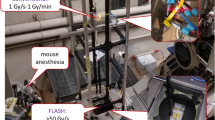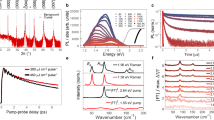Abstract
THE bactericidal effect of ionizing radiation has been recognized for many years; but it is only recently that serious attention has been given to this method of sterilization for foodstuffs1 and for pharmaceutical and other products2,3. This is due mainly to the increased availability of radioactive isotopes. In this respect γ-radiation seems to be the most useful due to its effective depth of penetration, and the most convenient sources of γ-radiation are cobalt-60 and cæsium-137.
This is a preview of subscription content, access via your institution
Access options
Subscribe to this journal
Receive 51 print issues and online access
$199.00 per year
only $3.90 per issue
Buy this article
- Purchase on Springer Link
- Instant access to full article PDF
Prices may be subject to local taxes which are calculated during checkout
Similar content being viewed by others
References
Niven, jun., C. F., Ann. Rev. Microbiol., 12, 507 (1958).
Horne, T., Second United Nations Conference on the Peaceful Uses of Atomic Energy, A/Conf. 15/P/276 (1958).
Horne, T., Pharmaceut. J., 122, 27 (1956).
Author information
Authors and Affiliations
Rights and permissions
About this article
Cite this article
HORNE, T., TURNER, G. & WILLIS, A. Inactivation of Spores of Bacillus anthracis by γ-Radiation. Nature 183, 475–476 (1959). https://doi.org/10.1038/183475b0
Issue Date:
DOI: https://doi.org/10.1038/183475b0
This article is cited by
-
The Effect of Radioactive Radiation on Growth Inhibition and Destruction of Food Spoilage Bacteria in Poultry Meat
Proceedings of the National Academy of Sciences, India Section B: Biological Sciences (2022)
-
Evaluation of Gamma-Radiation Inactivation of a Bioterrorism Agent, Bacillus anthracis Spores, on Different Materials
Indian Journal of Microbiology (2018)
-
Inactivation of spores by electric arcs
BMC Microbiology (2016)
Comments
By submitting a comment you agree to abide by our Terms and Community Guidelines. If you find something abusive or that does not comply with our terms or guidelines please flag it as inappropriate.



